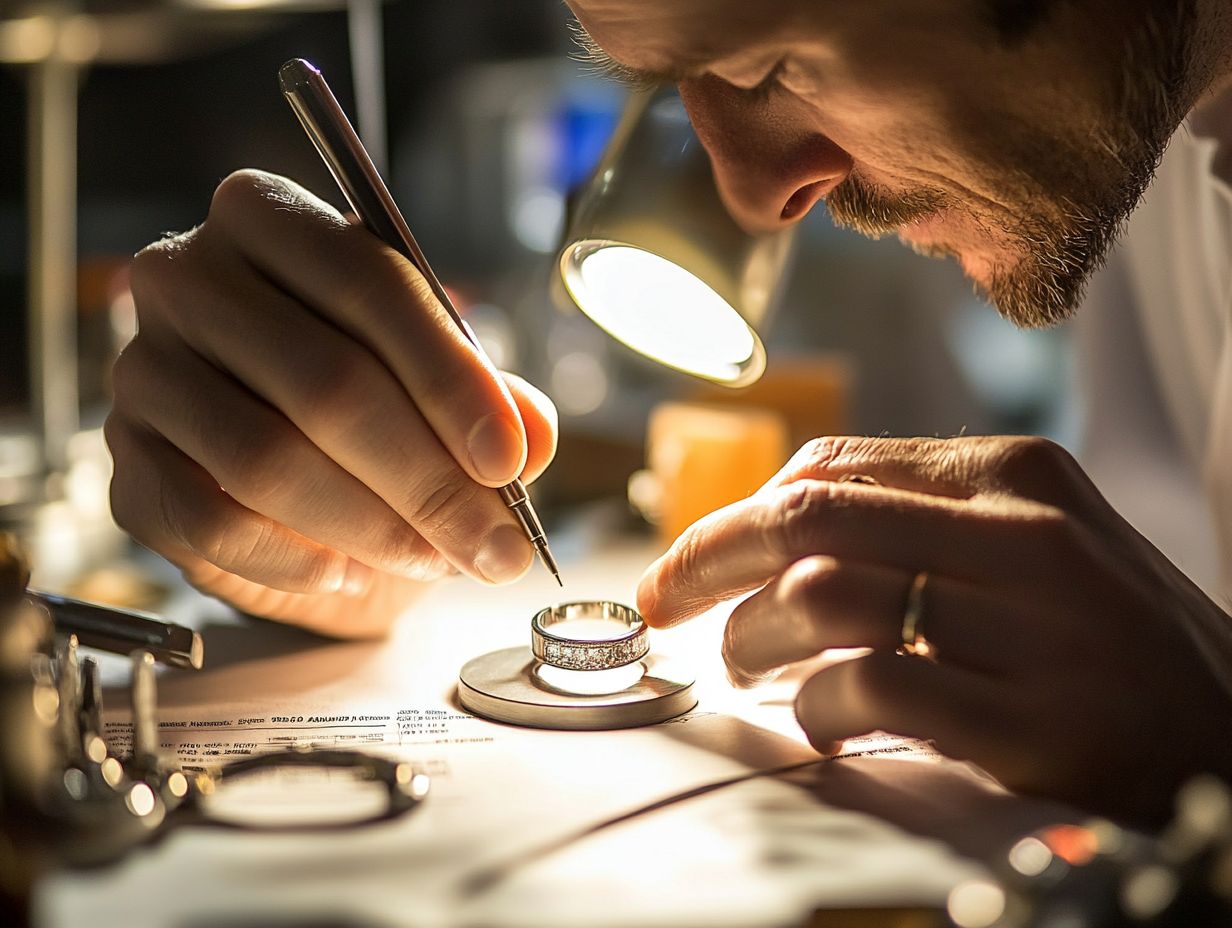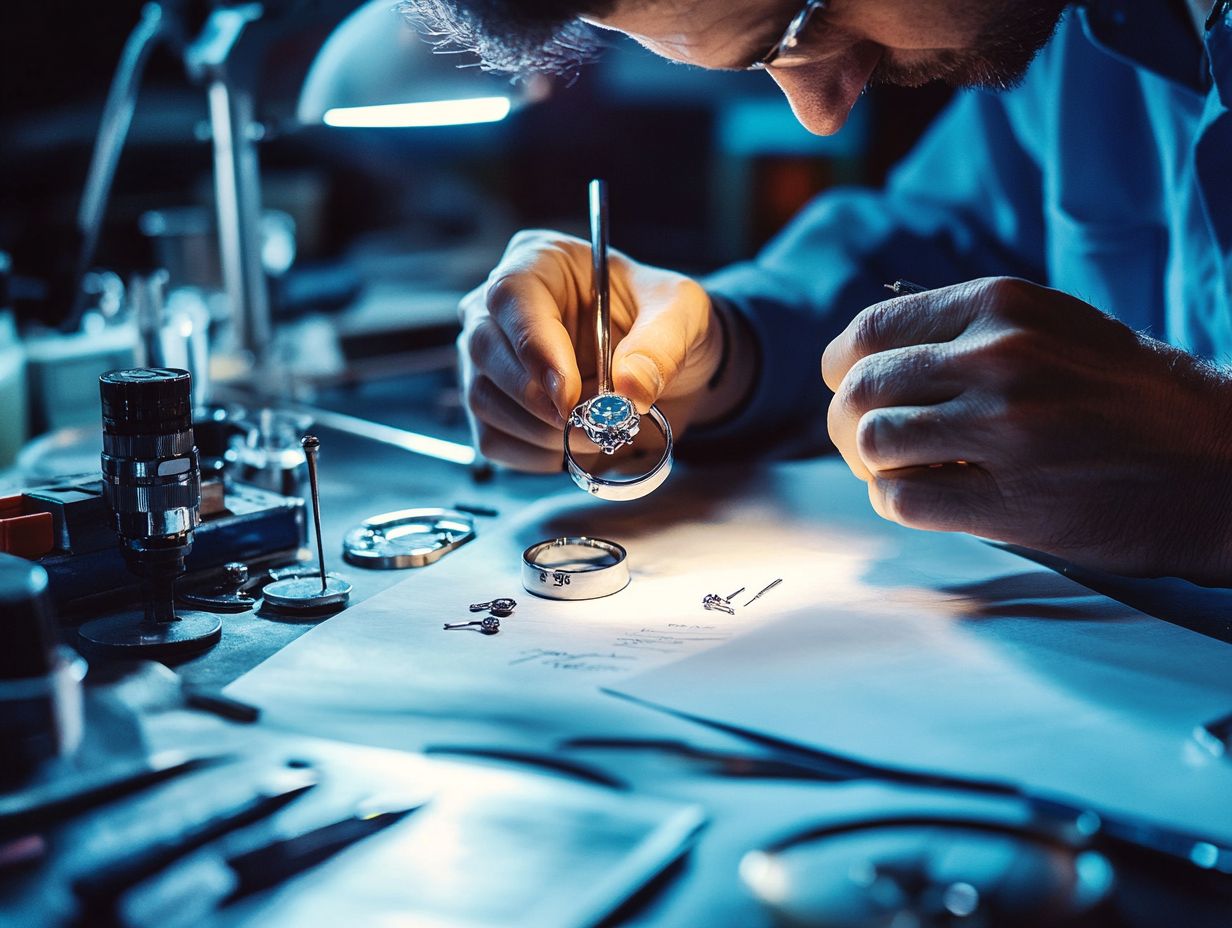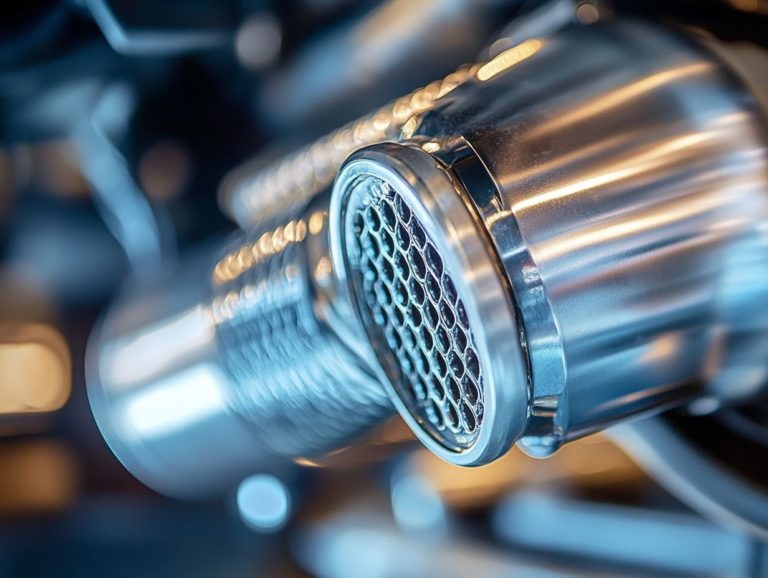The Importance of Quality Assurance in Platinum
Quality assurance is essential in the platinum industry, ensuring that this precious metal consistently meets the highest standards of purity and excellence.
As the demand for platinum continues to surge, especially in industrial applications and jewelry, grasping the intricacies of quality assurance becomes indispensable.
Let s explore what quality assurance means and why it matters. This article highlights its significant impact on consumer satisfaction and the methods employed to maintain these standards.
It also addresses the challenges encountered in upholding quality and the innovative solutions being implemented to tackle them.
If you re a consumer, jeweler, or industry professional, understanding these concepts will enhance your appreciation for platinum.
Contents
- Key Takeaways:
- Understanding Quality Assurance in Platinum
- The Role of Quality Assurance in Platinum Production
- Benefits of Quality Assurance in Platinum
- Common Quality Assurance Techniques in Platinum
- Challenges and Solutions in Quality Assurance for Platinum
- Frequently Asked Questions
- What is the importance of quality assurance in platinum?
- How does quality assurance affect the value of platinum?
- What role does quality assurance play in the production of platinum?
- Why is it important for platinum to undergo quality assurance testing?
- How does quality assurance benefit the consumer?
- What are the consequences of not having quality assurance in platinum?
Key Takeaways:

- Quality assurance ensures platinum’s purity and high value.
- It significantly impacts consumer satisfaction and industrial standards.
- Key techniques include assaying, testing, and ethical sourcing.
Understanding Quality Assurance in Platinum
Quality assurance in platinum represents a careful process designed to uphold the purity and consistency of platinum products, especially in the realm of jewelry manufacturing. This involves strict adherence to ISO standards, which are international guidelines that ensure quality and safety, such as ISO 9001 and ISO 14001, focusing on quality management and environmental responsibility.
By embracing robust quality assurance practices, you can markedly elevate customer satisfaction, minimize defects, and promote a culture of continuous improvement. This dedication reinforces a commitment to excellence in the world of precious metals, including the importance of platinum in industrial applications.
Definition and Purpose
Quality assurance is all about the systematic processes and procedures you implement to ensure your products meet or exceed specified quality standards, especially in the platinum industry. This essential framework doesn’t just focus on optimal production methods; it also weaves in detailed protocols for monitoring every stage of the manufacturing process.
For businesses like yours that are engaged in platinum production, quality assurance helps meet customer expectations, which often hinge on purity, durability, and ethical sourcing. To further enhance your understanding, consider exploring understanding platinum: characteristics and uses.
It s vital for you to distinguish between quality assurance and quality control. Quality assurance emphasizes proactive planning and adherence to standards, while quality control typically involves reactive measures identifying and addressing defects after production has occurred.
Align your quality assurance practices with environmental management, ensuring that sustainability standards are upheld throughout the supply chain.
The Role of Quality Assurance in Platinum Production
Quality assurance is essential in platinum production, providing a robust framework for quality control activities that guarantee the highest standards are upheld throughout the manufacturing process, from ring sizing to assembly practices. This commitment enhances the overall product quality and cultivates a culture of continuous improvement within organizations like Platinum Industries.
In this context, employee training becomes paramount, ensuring that every team member is well-prepared to adhere to the established quality management protocols.
Ensuring Purity and Consistency
Ensuring the purity and consistency of platinum products is essential for maintaining their value and allure, especially in high-end jewelry that employs platinum settings. This commitment enhances both beauty and durability, which are crucial for discerning consumers like you.
To achieve this level of excellence, various analytical methods are utilized. These include fire assay, X-ray fluorescence, and a technique that uses advanced technology to analyze the metal’s composition. Each of these techniques accurately determines the metal’s composition. These testing methods not only verify the platinum’s purity but also build your confidence in its quality, ultimately enhancing your satisfaction as a customer.
By adhering to strict quality assurance protocols, manufacturers ensure that their platinum products meet and exceed industry standards. Understanding the role of platinum in the automotive industry highlights this dedication to excellence, fostering a trustworthy reputation in a competitive market, making your choice all the more rewarding.
Benefits of Quality Assurance in Platinum

Implementing robust quality assurance practices in platinum enhances product integrity and unlocks substantial benefits. This leads to heightened customer satisfaction and elevates quality management throughout your organization.
Impact on Consumer Satisfaction
The impact of quality assurance on your satisfaction in the platinum jewelry market is significant. It directly influences your trust and loyalty.
When you seek platinum jewelry, you are looking for quality and authenticity. These elements are ensured through rigorous quality control measures. For instance, when a jewelry manufacturer conducts comprehensive inspections at every production stage, from sourcing raw materials to the final polishing, they show a commitment to excellence, much like the understanding of platinum’s role in catalytic converters highlights the metal’s significance in various applications.
This meticulous attention guarantees that each piece meets the highest standards of durability and brilliance. You can be assured that your investment is sound. Transparent certification processes, particularly those offered by respected gemological institutes, further enhance your confidence as a buyer.
By consistently meeting or exceeding your expectations through these quality assurance practices, businesses enhance their reputation and pave the way for remarkable growth and a loyal clientele.
Importance in Industrial Applications
Quality assurance is critical in the industrial applications of platinum. The use of platinum alloys requires a commitment to quality standards to guarantee performance and reliability. This importance is especially high in high-stakes environments such as aerospace and medical devices.
By implementing rigorous quality assurance processes, you enable continuous improvement that aligns with ISO standards. This drives your operations toward exceptional efficiency. Consider a manufacturer who diligently tests platinum-based components; this meticulous approach can dramatically reduce failure rates and lead to enhanced product reliability, highlighting the role of platinum in electronics manufacturing.
Such reliability elevates customer satisfaction and fortifies trust in your brand. Buyers will appreciate the durability and integrity of products crafted with platinum alloys. To learn more about this versatile metal, consider the top 5 uses of platinum beyond jewelry. Ultimately, a strong emphasis on quality assurance maximizes the advantages of platinum while effectively minimizing any associated risks.
Common Quality Assurance Techniques in Platinum
Common quality assurance techniques in platinum include various methodologies such as assaying, certification, and strict adherence to ISO standards.
These practices are essential for upholding the integrity and quality of platinum products. They ensure that you receive nothing short of excellence.
Assaying and Testing Methods
Assaying and testing methods are essential to your quality assurance process in the platinum industry, providing crucial data to validate the purity and composition of your platinum materials.
These methodologies include a range of sophisticated techniques, such as fire assay, x-ray fluorescence, and methods that use plasma to analyze mass spectrometry. Each technique is tailored to meet specific testing needs in unique ways. By utilizing these advanced methods, you can precisely determine metal content and identify impurities that could jeopardize product quality.
This meticulous attention to detail ensures compliance with industry standards and fosters consumer trust in the materials you use. Ultimately, your effective quality control practices hinge on these assaying processes, enabling your business to maintain a competitive edge and drive continuous improvement in operations.
Certification and Standards

Certification and adherence to ISO standards are essential pillars of a quality assurance policy in the platinum industry, ensuring that your products not only meet but surpass industry expectations.
These standards provide a comprehensive framework that governs every facet of production and processing, fostering consistency and reliability in the final output. By embracing ISO guidelines, you showcase your commitment to excellence, ultimately enhancing consumer confidence in your brand.
Certifications cultivate a culture of continuous improvement, helping your organization streamline operations and minimize waste. Such practices elevate operational efficiency and promote sustainable methods in extracting and processing platinum, underscoring the industry’s responsibility toward environmental stewardship.
Challenges and Solutions in Quality Assurance for Platinum
The challenges you encounter in quality assurance for platinum are indeed multifaceted. From dealing with impurities to ensuring ethical sourcing and production practices, you face a complex landscape that requires effective solutions to maintain the integrity of your product.
Addressing Impurities and Contaminants
Addressing impurities and contaminants is paramount for maintaining quality assurance in platinum; even the slightest deviations can have a profound impact on product integrity.
Common impurities like palladium, rhodium, and base metals can introduce variability in platinum s properties, ultimately compromising its performance across various applications. In industries that adhere to the highest standards such as aerospace and electronics the presence of these contaminants can result in operational failures or subpar performance.
To combat these challenges, rigorous testing methods, including optical emission spectroscopy (OES) and inductively coupled plasma mass spectrometry (ICP-MS), are employed to accurately assess purity levels and pinpoint specific contaminants. By implementing these measures, you ensure that the final product meets stringent quality standards, instilling confidence in clients who rely on the reliability of platinum components.
Ensuring Ethical Sourcing and Production
Ensuring ethical sourcing and production in the platinum industry is essential for maintaining quality assurance while aligning with global standards and consumers’ expectations for environmental sustainability.
By prioritizing transparency within the supply chain, you elevate the integrity of your products and cultivate trust among increasingly informed consumers who care deeply about the origins of their purchases. This dedication to responsible practices builds trust with stakeholders, as ethical considerations increasingly shape brand loyalty and competitiveness in the market.
As environmental research continues to unveil the impacts of mining and manufacturing on ecosystems, the need for sustainable methods becomes ever more evident. Act now to adopt sustainable practices that meet both consumer needs and environmental responsibilities!
Frequently Asked Questions
To be updated with relevant questions and answers.
What is the importance of quality assurance in platinum?

Quality assurance in platinum is crucial for ensuring the metal meets the highest standards of purity. This is especially important in jewelry making, where defects can impact the final product’s quality.
How does quality assurance affect the value of platinum?
Platinum with high quality checks is more valuable in the market due to its purity and durability. This makes it a sought-after metal, especially in the jewelry industry, where customers are willing to pay a premium for top-quality pieces.
What role does quality assurance play in the production of platinum?
Quality assurance is a vital part of platinum production. It involves strict testing and inspection measures to ensure that the metal meets required standards throughout the mining, refining, and final production stages.
Why is it important for platinum to undergo quality assurance testing?
Platinum is not just rare; it’s a treasure! Ensuring its quality is key to maintaining its value. Quality assurance testing identifies impurities or defects in the metal, ensuring only the best quality platinum is used in production.
How does quality assurance benefit the consumer?
Quality checks in platinum production benefit consumers by providing high-quality, durable products. This gives them peace of mind, knowing they are getting their money’s worth and can rely on the metal’s quality and purity.
What are the consequences of not having quality assurance in platinum?
Without proper quality checks, there is a risk of selling platinum that does not meet required standards. This can lead to a loss of trust from customers and a decrease in the metal’s value, ultimately affecting the industry as a whole.















